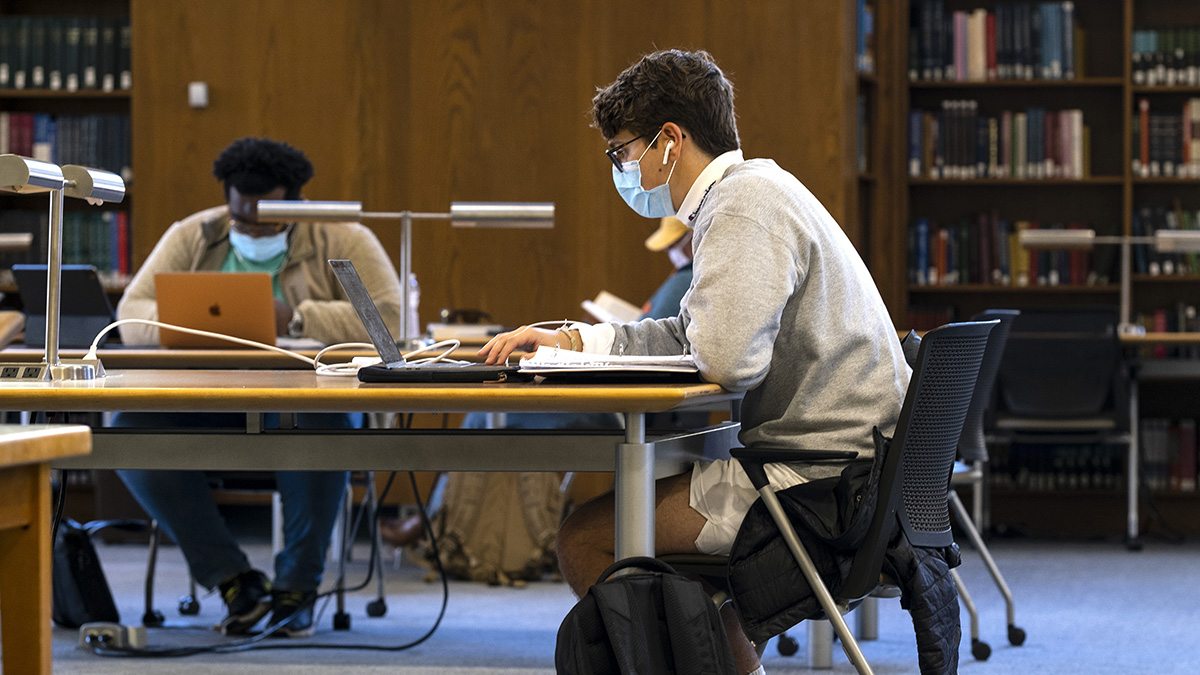Delta variant underscores need for COVID-19 Community Standards
Public health expert Kurt Ribisl explains the University’s COVID-19 Community Standards, including the importance of registering your vaccine and wearing a mask while indoors.

As University employees return to working on campus and prepare for the fall semester to begin in less than two weeks, the University’s updated COVID-19 Community Standards are even more essential given the rise of the virus variants. The standards, which include masks being required when indoors, recommended vaccinations and required COVID-19 testing for unvaccinated students, will help prevent the spread of the delta variant, which according to the U.S. Centers for Disease Control and Prevention, is responsible for more than 80% of recent COVID-19 cases in the U.S.
Kurt Ribisl is the chair and Jo Anne Earp Distinguished Professor in the health behavior department at the UNC Gillings School of Global Public Health and one of many Carolina experts who helped develop the COVID-19 Community Standards. He spoke with The Well about the reasoning behind the current guidelines and emphasized the importance of registering your vaccine and wearing a mask while indoors.
Can you summarize the University’s current guidelines?
The COVID-19 Community Standards describe the expectations for our students, faculty and staff to reduce the spread of COVID-19. The key items are a recommendation to get vaccinated, wearing a face mask indoors (unless eating or alone in a private office), participating in the COVID testing program if you are not vaccinated and participating in contact tracing efforts if you were exposed to someone who is infected.
On May 14, North Carolina lifted the mask mandate for vaccinated individuals on the recommendation of the CDC. Why do individuals still need to wear a mask indoors on campus?
Although many businesses are not requiring masks, with the rise of the more infectious delta variant, that is starting to change. I know it isn’t fun to wear a mask indoors and people are getting tired of them, but it really is what we need to do to protect others. Some members of the Carolina community are not vaccinated or have compromised immune systems, so the vaccine is not fully protecting them. Each of us should do our part to help keep our fellow students, faculty and staff as safe as possible. Even if you are vaccinated, the vaccines are not perfect (at most 95% effective). Wearing a mask will help reduce “breakthrough” infections. The rapid rise of the delta variant has been a game-changer in many locations and underscored the need to step up our precautions.
Under what circumstances am I allowed to remove my mask while indoors?
Faculty and staff are allowed to remove their mask in a private office by themselves. Students are allowed to in their residence hall room or suite. Anyone can remove their mask when eating or drinking on campus. Also, vaccinated faculty can take off their mask while teaching classes.
Why isn’t Carolina requiring all community members be vaccinated before they return to campus?
Current regulations permit UNC and other public universities to require certain vaccinations. However, the COVID vaccination is not yet on this list of mandated vaccines. I am hopeful that each university will have the choice in the near future as to whether they would like to implement a COVID-19 vaccine requirement. Many universities are now starting to mandate COVID vaccination including several in our state. It is likely that several COVID-19 vaccines will receive full authorization from the U.S. Food and Drug Administration in the coming months and that will hasten the adoption of vaccine requirements in many businesses and educational institutions.
Why is it important to register my vaccination?
Registering your vaccination status will help the University’s medical and public health experts better plan efforts to reduce the spread of COVID-19. Nearly 25,000 students have indicated they have received a vaccine so far. I registered my vaccination, and I hope other faculty and staff members will consider doing that as soon as possible if they haven’t already. Remember to have your vaccination card handy when you register your vaccination.
The community standards say that I can’t ask a person’s vaccination status, but many people on campus have children who haven’t been vaccinated or are caretakers for individuals with health concerns. How can they assure they are keeping loved ones safe while also adhering to community standards?
We have lots of parents with young children who are not yet old enough to get vaccinated. We all need to do our part to protect them from passing along an infection to their children or to family members who have medical conditions that increase their risk. Please do your part by wearing a mask indoors and getting vaccinated to keep everyone safer.
Why is University-affiliated international travel still prohibited?
In accordance with UNC System Office policy, Carolina continues to prohibit University-affiliated international travel. The situation in countries around the world continues to change, and countries are still regularly changing their travel policies, sometimes with little notice. Many countries have fewer than 10% of their population vaccinated, and there’s potential for University personnel to get stuck in other countries during an outbreak with limited health care options. If you have a strong case for traveling abroad, there is a process for seeking an exemption, and these requests are carefully reviewed. I’m hopeful that travel will become more possible as other countries ramp up their vaccination programs in the coming year.
The pandemic continues to evolve. How is Carolina monitoring public health conditions and how will leaders act to keep the community safe?
I’m very pleased that University leadership has sought out the advice of Carolina’s leading infectious disease experts in public health and medicine, and my colleagues and I are in meetings every week monitoring the situation and constantly adjusting our policies and procedures. The most important act to keep everyone safe is one that any community member can take – getting a vaccine.




